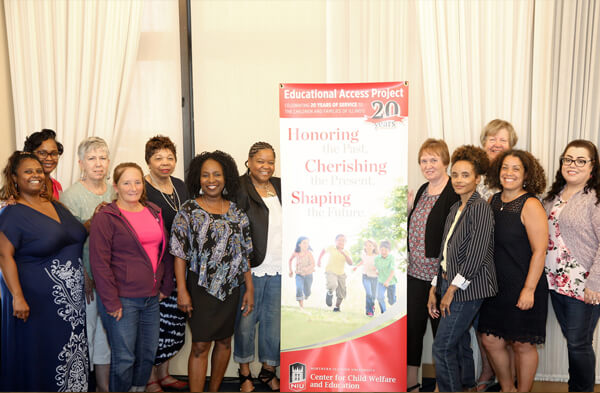The NIU Center for Child Welfare and Education is celebrating the twentieth anniversary of its Educational Access Project (EAP), a project that promotes educational success for children in foster care.
According to Angela Baron-Jeffrey, the Center’s director, since 1997 the EAP has partnered with the Illinois Department of Children and Family Services (DCFS) to provide educational interventions, consultation, support for and collaboration with youth, caregivers, caseworkers, educators and others who serve youth in foster care. EAP’s goal is to help youth maintain consistent access to quality education in spite of barriers, which include movement to a new family or school, trauma and its impact, academic issues and disabilities.
“DCFS has about 15,000 youth. Youth in foster care face a lot of obstacles in pursuing educational services,” says Baron-Jeffrey. “We have a stable group of Education Advisors who advocate for them and do a phenomenal job promoting what’s in the child’s best interest.” These Advisors are in DCFS offices throughout the state, in close proximity to the families they serve. They are called to intervene on education issues that affect the youth.
NIU alumna Christine Buckner (BA Sociology 2012, MA Sociology 2016) was one youth in care who benefitted from the EAP program housed at the Center. Buckner, who grew up in the Chicago area, says when she was 18 years old the education advisors helped her research funding options so she could go away to college. These advisors have continued to be part of her life. “When I had a problem, I knew I could reach out to them and they’d walk me through it and give me ideas about how to deal with the situation. We formed a relationship with each other, and they came to my baby shower last year. When you’re in foster care, you kind of feel alone, but I don’t feel that way anymore.”
In addition to advocating for individual children, the Center educates caregivers, caseworkers, teachers and others about how best to address the educational needs of youth in care. “We’re part of a university, and we’re educators,” Baron-Jeffrey says. “While we work with the adults and youth, we teach and model so they can learn for the next time. We also provide professional development. We want to build capacity to increase the likelihood for more youth to succeed.”

Staff of the Center for Child Welfare and Education
Furthermore, the Center helps to develop and implement state policies that benefit youth. At its inception, the Educational Access Project helped DCFS develop and implement its first ever education policy, which was issued in 1997. The Center also helps align policies with new state and federal laws to improve services. For example, a revision in 2004 allowed children in foster care to remain in their school of origin even when moved to a different home or school district.
The policies and processes created by the Center and its EAP serve as a model and inspiration nationwide. “We’ve had an impact on thousands of children and families in Illinois. We’ve also influenced the way other states seek to ensure youth in foster care access to educational services,” says Baron-Jeffrey.” We would like to continue to expand the knowledge and expertise we’ve gained beyond Illinois. We want to help more youth.”
